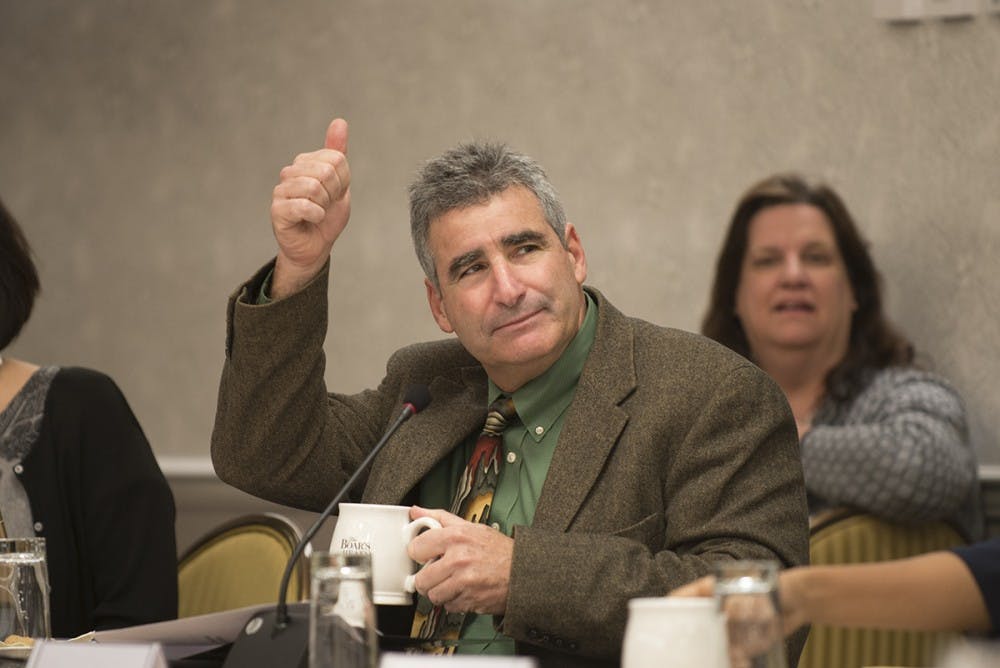The Executive Committee of the University Board of Visitors voted Wednesday to allocate $7.88 million for the renovation and restoration of Carr’s Hill, the 109-year-old home of the University president last repaired in 2007. The committee also authorized a new master’s degree in business analytics through a partnership between the McIntire School of Commerce and the Darden School of Business.
Rector Frank M. Conner III said this is an opportune time for the repairs to Carr’s Hill, as the University is currently in the process of changing presidents.
“This is something that’s been long in the works,” Conner said.
Until the repairs are complete — around Summer 2019, Colette Sheehy, senior vice president for Operations, said — University President-elect James E. Ryan will live in Pavilion VIII on the Lawn, which formerly housed the University Guides Service.
A February 2016 report by the University Office of the Architect and the Historic Preservation Team in Facilities Planning and Construction recommended Carr’s Hill undergo several nonessential repairs, including one to a longstanding structural flaw wherein the roof load was partially directed through non-load-bearing interior walls.
The problem was documented in 2006 and 2014. The 2016 report notes there has been no significant increase in deformation since the problem was reported and the design flaw is not thought to be an immediate threat or safety hazard.
The report also suggested upgrades to the house’s heating, ventilation and air-conditioning system, plumbing systems, electrical wiring and phone lines, as well as replacing or restoring some of the house’s historical features, such as cabinets and lighting fixtures.
The repairs were approved by the Board of Visitors in the 2017 Multi-Year Capital Plan in June 2017. The University requested proposals from architectural consulting firms the following September and ultimately selected Glavé & Holmes Architecture, a firm based in Richmond.
Concerning the new master’s degree through McIntire and Darden, the year-long program — catering to working professionals in the Washington, D.C. area — will be based in Arlington, Va., with classes taught on weekends.
McIntire, Darden and the University’s Data Science Institute already offer similar degrees — McIntire’s M.S. in commerce with a concentration in business analytics, Darden’s MBA with a concentration in business analytics and DSI’s M.S. in data science.
In a letter to Archie Holmes, vice provost of academic affairs, three administrators — Director of DSI Philip Bourne, Dean of McIntire Carl Zeithaml and Dean of Darden Scott Beardsley — enumerated the differences between the existing coursework and the proposed program.
“Although some of the course titles are similar, the learning outcomes and expected level of expertise across the degree programs are very different,” the letter read.
According to the letter, some differences include the expectation that data science students will be expected to be competent in coding, modeling and the use of analytic tools. Meanwhile, students in business analytics courses will be expected to be knowledgeable of the concepts and tool but have greater proficiency in business challenges facing organizations.
The 30-credit-hour master’s program is expected to cost $59,000 for both in-state and out-of-state students, according to the proposal passed by the committee. Comparatively, for an in-state student pursuing a McIntire master’s in commerce, tuition and fees are $43,912. Out of state, the cost jumps to $49,920.
For the program’s first cohort, administrators are hoping for 60 students — but it first must get approval from the State Council of Higher Education for Virginia. That process usually takes one or two months, said Thomas C. Katsouleas, executive vice president and provost.







